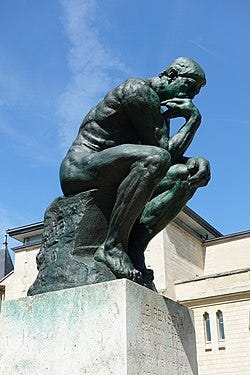How scientists write and think
5 November 2025
This essay is based on my experience and observations. Of course, it is a generalization and there are many exceptions.
My writing reflects my training - four years of medical school and five years of residency and fellowship. I recognize that my education is a privilege, one that carries a responsibility to use my knowledge for the betterment of society. I also have an obligation to be as honest and accurate as possible. I cannot simply “spout off” when angry or frustrated.
My work should rest on accepted scientific literature. If I deviate from it, I must acknowledge the differences and explain why I disagree. I do not have the authority to claim that large numbers of scientists are wrong while I alone am right.
My sources are scientific journals and academic institutions dedicated, as I am, to evidence-based knowledge.
I believe that facts matter. There are no “alternative facts”, only lies or untruths. Repeating a lie or making threats does not make it true.
Integrity is essential in science. We must acknowledge and repeat the truth, even when doing so invites criticism or attack.
I respect the opinions of scientists. When I encounter differing viewpoints, I try to understand them: by asking questions, researching the literature and thinking carefully before responding. I cannot dismiss others outright unless their views are clearly fanatical.
Unfortunately, fanatics exist. They are easy to recognize: they appeal to emotion rather than data, define themselves by criticizing others and constantly seek attention. I know of no legitimate scientist who behaves this way regularly.
Science is not emotional. It is rational, grounded in evidence that others can verify. Those who habitually appeal to emotion are not practicing science.
I approach social media with skepticism. I assume it is false until proven otherwise, since its main goal is entertainment or emotional engagement, not the dry, factual precision that characterizes science.
I am confident in my scientific understanding. I have no need to prove how smart I am, dominate discussions or tell others they are wrong.
I possess two superpowers that anyone could have, but few use: I admit when I am wrong and I acknowledge when I don’t know something.
Scientific progress is usually incremental, built on small, unglamorous advances that seem unremarkable at the time. Occasionally, there are dramatic breakthroughs that capture attention, but these depend on the quiet, steady accumulation of prior discoveries. Sometimes, knowledge even appears to move backward when earlier conclusions are disproven. That, too, is science and it should be celebrated, not condemned.
My political blog focuses on what you can or should do to make the world a better place and yourself a better person. I have another blog on Cancer and Medicine.
The index to my political essays since 5 November 2024 is here.
What you can do today:
Follow me at:
LinkedIn - https://www.linkedin.com/in/nat-pernick-8967765
Threads or Instagram - npernickmich
BlueSky - natpernick.bsky.social
Email me at Nat@PathologyOutlines.com.
I also publish Notes at https://substack.com/note. Subscribers will automatically see my notes.



Skeptical thinking and rigorous questioning are even more necessary now than in 1995, when Carl Sagan wrote about the need for them in: "A Candle in the Dark: Science in a Demon Haunted World". Most Americans have not been trained to think critically, unlike, say in Finland, where children as young as six years begin to practice it as part of their education to be able to live in a world of disinformation on social media. So America is a paradise for cheats and charlatans, religious cults, and scams of all kinds. That's not new. Mark Twain's rogues, "the King" and "the Duke", in "Huckleberry Finn" and any number of cult leaders have exemplified the type. Yet a majority of Americans still voted twice into the presidency a lifelong cheat and compulsive, congenital liar who is also an ignoramus driven by greed and spite, and a sexual degenerate and predator. They believed his false promises of lowering prices and restoring American greatness by hunting down and deporting immigrants whom he falsely accused (using Hitler's phrase) of "poisoning the blood".
Nat, have you read Thomas Kuhn’s book “The Structure of Scientific Revolutions”? I think it’s at odds with some of your expressed views in this piece.